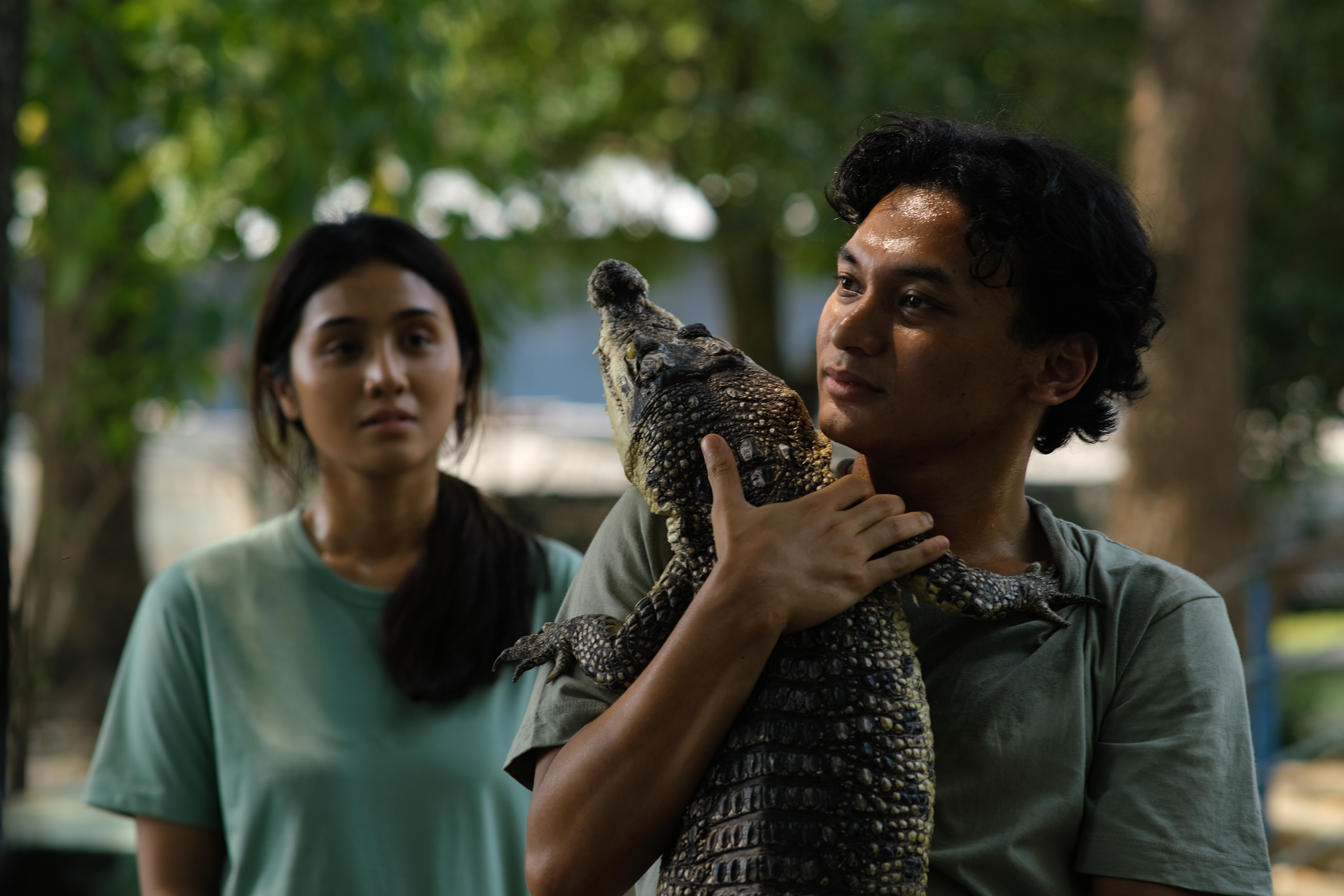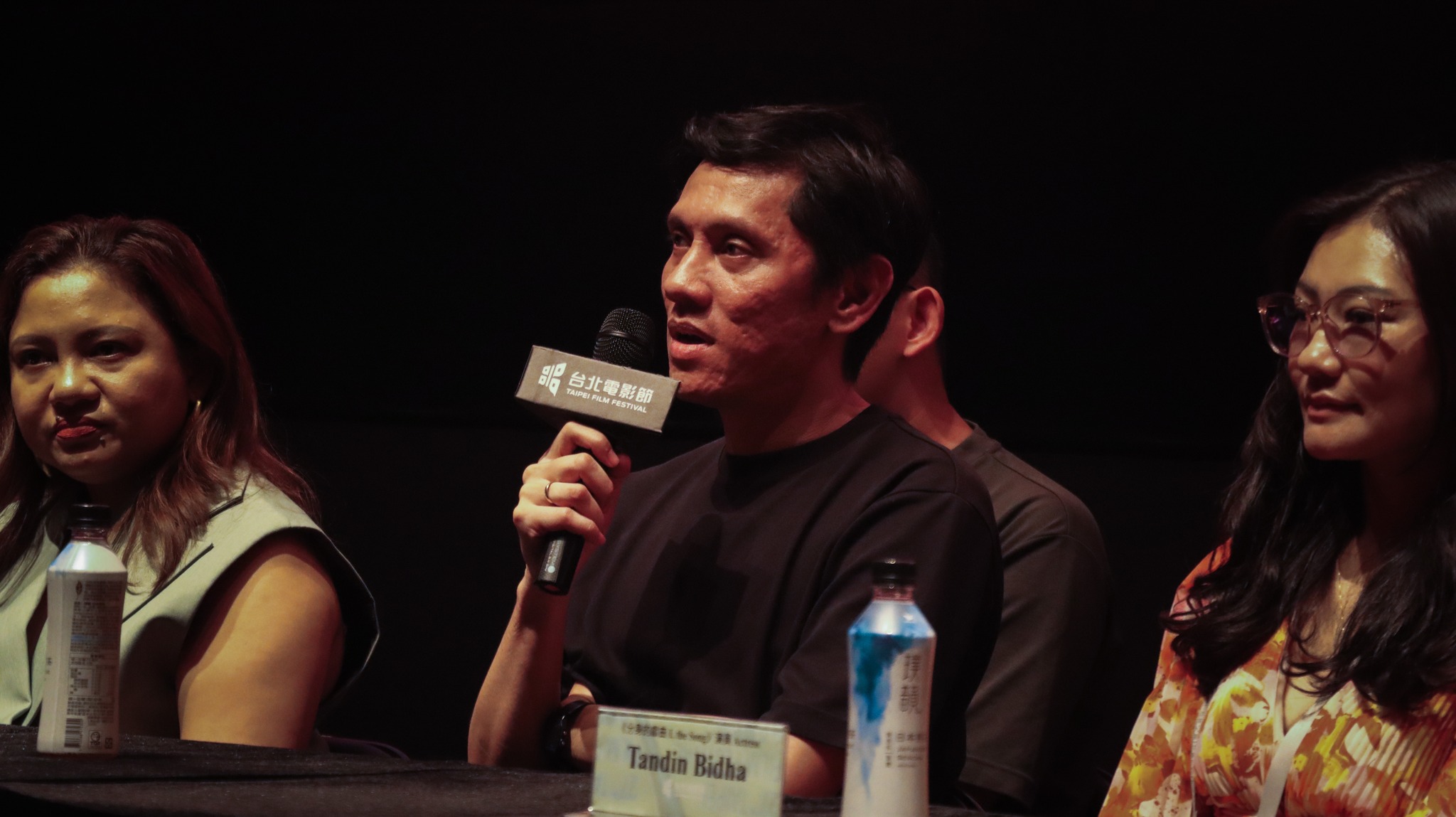While juggling screenings and his activity at the 2025 Taipei Film Festival, TAEF (Taiwan-Asia Exchange Foundation) spoke with director Tumpal Tampubolon about his debut feature film, Crocodile Tears, to explore his artistic process, inspiration, approach, and his position in Asian Cinema.
TAEF: You always said Crocodile Tears is about love. What kind of love do you aim to present in the film?
Tumpal Tampubolon: Basically, I want to explore the other side of love. Family love is usually captured by its warmth and filled with ideal values. The love in this film is the other side of it. However, it's like two sides of the same coin.
This is the gripping love, the obsessive, the possessive one, but at the same time, I don’t want to judge this kind of love as wrong. Instead, I want to show where the characters’ intense expressions of love come from. For Mama’s love, there might be something that comes from trauma, or loneliness that is very, very deep, that she has carried, resulting in her being like that.
While Johan’s love is between pure love and devotion, Arumi’s is more pragmatic. Her feelings for Johan initially come from practicality, to save her life. However, as time passes, she begins to notice, she sees something in him about the quality of his dedication and commitment.
TAEF: You also mentioned that in Indonesia, many stories and myths are associated with crocodiles. In the film, you incorporate a love myth related to a crocodile. Did you draw from existing tales, or did you create a new one?
TT: From what I’ve learned, crocodiles are actually one of the few animals known to be monogamous. Another one is the Bali myna. That’s why, in Betawi culture (one of the ethnic groups in Indonesia), you’ll find something called “crocodile bread,” which is used as a symbol of loyalty. I thought that those were interesting biological and cultural facts, so I used them to create a kind of mythology for the crocodile park in the film.
And then, there is the idea about crocodile tears, which happen when a crocodile eats their prey. It is part of its physiological response, but for humans, it's like fake tears. It is anthropomorphism, how we project human emotions or intentions onto animals to make sense of things that are outside of us. Humans saw that and created a whole symbolic meaning around it. So, in the film, I wanted to play with that idea. There’s a moment when the mother seems torn, like she wants to devour, to prey, but also wants to cry. That emotional contradiction felt very close to the whole crocodile symbolism. I also think the environment the characters live in shapes them in similar ways. We can see in the spooning gesture, or at the end, we can see Johan crawl like a crocodile.
TAEF: Some crocodiles protect their young by hiding them in their mother's jaws to shield them from predators. Does this mean Arumi is a predator?
TT: From Mama's perspective, yes, Arumi is a predator. Johan rarely leaves the crocodile park. It’s almost like a nest for him. Psychologically, he may find it difficult to socialize. There are also negative rumors about Mama’s husband, which are merely village gossip. Therefore, Mama perceives the outside world as more dangerous than crocodiles. Humans, in Mama's view, are indeed more dangerous than crocodiles.
TAEF: In the film, it seems like Mama is possessed by the crocodile. Of course, we can interpret this in various ways. It is her psychological condition, or maybe she really is possessed. But what is actually going on here?
TT: Is Mama actually possessed? Or is that just someone's projection?
Most of the strange things in the film happen at night and when they are asleep. I tried playing around with the time and space throughout the film, making it non-linear on purpose. The more viewers follow the story, the more surreal it becomes. Like a dream where time and space start to blur.
There’s also another layer to the film. I kind a see the film itself as like the crocodile. Crocodiles are silent and patient, but when prey gets too close, they strike suddenly. That’s how I see the film too. It’s quiet, it stalks, and then suddenly it pounces. So, in a way, the film is a crocodile. You can’t quite trust it. You think you’re safe in the river because the water is calm. But you’re not.
TAEF: What's more intriguing here is the father figure. This father exists as a myth, only present in the oral stories, through gossip, where everyone has their own version.
TT: I have always been fascinated by legends, myths, rumors, and gossip. This is how humans try to make sense of the world around them. In this context, the father's figure is presented through gossip, though nothing is definitive.
What really matters is the impact the father’s figure has had on Mama. He seems to have been traumatic to Mama. We can see in moments like when Mama cries at the white crocodile. To me, it expresses how the human mind is incredibly complex and fascinating, especially in how we deal with trauma. The workings of the human brain are truly intriguing.
TAEF: Crocodile Tears blends various genres, including family drama, thriller, and surrealism. How do you approach it and make it work?
TT: This has also been one of the challenges since the scriptwriting stage. I always get asked, 'So, what's the genre?' And I always say, 'The genre is just... film. But in the film industry, genre does matter, especially for promoting the film. So, we ended up calling it a magical drama. For me, that’s just a label.
Although for me it's just a label, indeed, the genre is one of my exploration areas as a screenwriter. I’ve written in various genres: comedies, martial arts, horror, family dramas, and even culinary. Genre is just a convention, not a strict law. Genre is just guidelines you can play with. You can break them well or mix them creatively. My ambition with this film is to play with those rules, make something aesthetically bold. I wanted to see if I could pull it off.
Of course, that’s a bit of a gamble. A lot of producers asked, 'So… what exactly is this?' But in the end, the film has been running for almost a year now. I’d say it works.
TAEF: So far, the film has been screened outside of Indonesia. How has the audience received it?
TT: I believe, even though this film is rooted in Indonesian culture and set in a crocodile park, the core values of the story are universal. We all have parents, children, and families, so the emotions and concerns each character expresses are related across cultures. Emotional expressions feel universal, regardless of language. Even if audiences are reading subtitles, the expressions and feelings come through clearly.
As for the crocodiles, this element may fascinate the audience. Some may want to see the film because of the crocodile. But once you get into it, it’s really a family drama at its heart.
In terms of genre, many critics have described it as genre-bending, and I think they understand what I’m trying to do with it.
TAEF: Lately, I’ve been watching several films from Southeast Asia, and I’ve noticed a rise in surrealist genres, stories with non-human characters and elements. Many of these films use those surreal aspects to explore social issues. It makes me wonder: how effective is this approach?
TT: If it's a trend, it often carries both positive and negative aspects. Trends can lead people to just copy what is popular. On the other hand, trends also can carry things along, especially when they come from a phenomenon, and filmmakers tend to respond to what is happening around them.
So when you say, Southeast Asian cinema uses nonhuman relations or environmental issues to accommodate social issues, I think, without exoticizing ourselves, this is the way to see ourselves and our position on this earth, which is different from Western eyes. And that is culture. These concepts should not be viewed as primitive or superstitious. We represent distinct worldviews that we should embrace again, through the language of cinema.
Film itself, as a form, does not come from our culture but instead stems from France and America. Yet, as a language, film can help us explain ourselves and how we perceive the world. This approach creates a more equitable playing field, making it easier for people to understand different perspectives through cinema.
TAEF: As a filmmaker, how do you see your position within Southeast Asian cinema?
TT: In my view, film culture in Southeast Asia is not as deep-rooted as in other countries in Asia, such as Japan and India. So, one of the big challenges for Southeast Asian cinema, especially in Indonesia, is defining itself. What exactly is Indonesian cinema?
To me, an authentic point of view doesn't need to be sought after. I simply express what truly disturbs or moves me, using the language of cinema. I strive to represent my true self. Born in Indonesia and live in Jakarta. I’m an urban person, and I bring that perspective into my work. That’s my authenticity.
TAEF: You have been involved in many roles, including screenwriter, director, and actor. Which one excites you the most?
TT: For me, writing and directing. Literature is my first love. I started my career as a writer and used to see films as something beyond my reach. It felt too technical, and also, coming from a family without connections to the film industry, made it seem even more unattainable. Whenever I had an idea, I would simply write it down. However, as time went on and technology became more accessible, I decided to try my hand at filmmaking.

